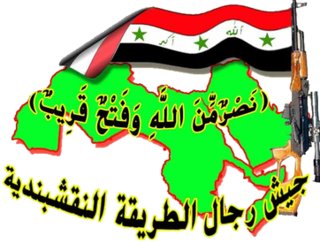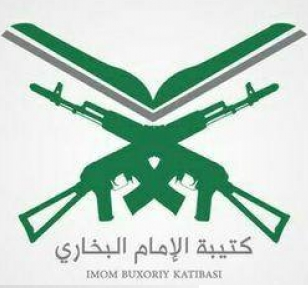 W
WThe Abdullah Azzam Brigades, or al-Qaeda in Lebanon, is a Sunni Islamist militant group, and the al-Qaeda's branch in Lebanon. The group, which began operating in 2009, was founded by Saudi Saleh Al-Qaraawi and has local networks in various countries, mainly in Egypt, Iraq, Syria, Jordan, Gaza Strip and Lebanon.
 W
WAnsar al-Islam or Ansar al-Islam fi Kurdistan, also referred to as AAI, is a Sunni Muslim insurgent group in Iraq and Syria. It was established in Iraqi Kurdistan by former al-Qaeda members in 2001 as a Salafist Islamist movement that imposed a strict application of Sharia in villages it controlled around Biyara to the northeast of Halabja, near the Iranian border. Its ideology follows a literal interpretation of the Koran and promotes a return to what it claims is the example of the first Muslims (Salaf). Following the 2003 invasion of Iraq, the group became an insurgent group which fought against the Kurdish government, American led forces and their Iraqi allies. The group continued to fight the Iraqi Government following the withdrawal of U.S. troops from Iraq, and sent members to Syria to fight the Government following the outbreak of the Syrian Civil War.
 W
WAnsar al-Sharia in Libya was a Salafist Islamist militia group that advocated the implementation of strict Sharia law across Libya. Ansar al-Sharia came into being in 2011, during the Libyan Civil War. Until January 2015, it was led by its "Amir", Muhammad al-Zahawi. As part of its strategy, the organization targeted specific Libyan and American civilians for death and took part in the 2012 Benghazi attack. The group was designated as a terrorist organization by the United Nations, Iraq, Turkey, the United Arab Emirates, the United Kingdom, and the United States.
 W
WAnsar al-Sharia in Tunisia is a radical Islamist group that operates in Tunisia. In 2013, the group was estimated to have roughly 10,000 members. It has been listed as a terrorist group by the Tunisian government as well by Iraq, the United Nations, the UAE, the United Kingdom and the United States. Some of its members may be linked to the 2015 Sousse attacks. In 2013, the group declared loyalty to Al-Qaeda.
 W
WFor the Sufi-based organization, see Chérif Ousmane Madani Haïdara.
 W
WThe Vanguards for the Protection of Muslims in Black Africa, better known as Ansaru and less commonly called al-Qaeda in the Lands Beyond the Sahel, is an Islamic fundamentalist Jihadist militant organisation based in the northeast of Nigeria. It originated as faction of Boko Haram, but became officially independent in 2012. Despite this, Ansaru and other Boko Haram factions continued to work closely together until the former increasingly declined, and stopped its insurgent activities in 2015. Since then, Ansaru is mostly dormant though its members continue to spread propaganda for their cause.
 W
WThe Army of the Men of the Naqshbandi Order, also called the Naqshbandi Army, is one of a number of underground Ba'athist and Sufi militant insurgency groups in Iraq. Media frequently refers to the group by the initials JRTN, a romanization of its Arabic name. Supreme Command for Jihad and Liberation, technically the name of the umbrella organisation to which JRTN belongs, is also often used to refer to JRTN specifically.
 W
WThe Islamic State in West Africa or the Islamic State's West Africa Province, formerly known as Jamā'at Ahl as-Sunnah lid-Da'wah wa'l-Jihād and commonly known as Boko Haram, is a jihadist terrorist organization based in northeastern Nigeria, also active in Chad, Niger and northern Cameroon.
Hamas of Iraq is a Sunni militia group based in Iraq, which split from the 1920 Revolution Brigade on 18 March 2007. The group claims to have released videos of its attack on US troops. The 1920 Revolution Brigade insists that Hamas in Iraq was involved in assisting US troops in their recent Diyala operations against Al-Qaeda in Iraq. Iraqi Prime Minister Nouri al-Maliki has feared the US-armed 'concerned local citizens' are an armed Sunni opposition in the making, and has argued that such groups should be under the command of the Iraqi Army or police. On October 11, 2007, the militia group joined a political council that embraced armed insurgency against American forces.
 W
WAl-Haramain Islamic Foundation (AHIF) was a charity foundation, based in Saudi Arabia. Under various names it had branches in Afghanistan, Albania, Bangladesh, Bosnia, Comoros, Ethiopia, India, Kenya, Malaysia, the Netherlands, Nigeria, Pakistan, Somalia, Tanzania, and the United States, and "at its height" raised between $40 and $50 million a year in contributions worldwide. While most of the foundation's funds went to feed poor Muslims around the world, a small percentage went to Al-Qaeda, and that money was "a major source of funds" for the terrorist group. In 2003, Saudi authorities ordered Al-Haramain to shut down all overseas branches, and by 2004 Saudi authorities had dissolved Al-Haramain. However, US intelligence officials believed it had reopened branches under new names.
 W
WThe Imam Bukhari Jamaat is an Islamist Salafi group fighting in the Syrian Civil War and the War in Afghanistan, composed of primarily Uzbeks, and expressing loyalty to the Taliban movement. The group originally operated only in Syria, where it is allied with other jihadist organisations such as al-Nusra Front and Ahrar ash-Sham, and alongside these other groups it makes up the Army of Conquest, which overran much of Idlib province in north Syria in 2015. Since late 2016, the group has also began to fight against Afghan National Security Forces, and has claimed to have set up training camps in northern Afghanistan.
 W
WThe Islamic International Peacekeeping Brigade, also known as the Islamic International Brigade, the Islamic Peacekeeping Army, was the name of an international Islamist mujahideen organization, founded in 1998. IIPB was designated a terrorist entity by the United States in February 2003.
 W
WThe Islamic State in the Greater Sahara (IS-GS) is a terrorist militant group with a Salafi Jihadism ideology. ISIS-GS was formed on 15 May 2015 as the result of a split within the militant group Al-Mourabitoun. The rift was a reaction to the adherence of one of its leaders, Adnane Abou Walid al-Sahraoui, to the Islamic State of Iraq and the Levant.
 W
WThe Islamic State of Iraq was a militant Salafist jihadist group that aimed to establish an Islamic state in Sunni, Arab-majority areas of Iraq during the Iraq War and later in Syria during the Syrian Civil War.
 W
WThe Islamic State of Iraq and the Levant, also known as the Islamic State of Iraq and Syria, officially known as the Islamic State (IS) and also known by its Arabic acronym Daesh, is a militant Islamist group and a former unrecognised proto-state that follows a fundamentalist, Salafi jihadist doctrine of Sunni Islam. ISIL was founded by the Jordanian jihadist Abu Musab al-Zarqawi in 1999 and gained global prominence in early 2014 when it drove Iraqi government forces out of key cities in its Western Iraq offensive, followed by its capture of Mosul and the Sinjar massacre.
 W
WThe Islamic State of Iraq and the Levant – Khorasan Province is a branch of the militant Islamist group Islamic State of Iraq and the Levant (ISIL) active in South Asia and Central Asia. Some media sources also use the terms ISK, ISISK, IS-KP, ISIS-K, or Daesh-Khorasan in referring to the group. The Khorasan group's main activity is in the border region of eastern Afghanistan and northern Pakistan, but its area of operations also includes other parts such as Tajikistan, and India where individuals have pledged allegiance to it.
 W
WThe Islamic State of Iraq and the Levant – Yemen Province is a branch of the militant Islamist group Islamic State of Iraq and the Levant (ISIL), active in Yemen. ISIL announced the group's formation on 13 November 2014.
 W
WThe Islamic State of Iraq and the Levant is a militant Islamist group active in Libya under three branches: Fezzan Province in the desert south, Cyrenaica Province in the east, and Tripolitania Province in the west. The branches were formed on 13 November 2014, following pledges of allegiance to ISIL leader Abu Bakr al-Baghdadi by militants in Libya.
 W
WNusrat al-Islam, officially known as Jama'a Nusrat ul-Islam wa al-Muslimin' is a militant jihadist organisation in the Maghreb and West Africa formed by the merger of Ansar Dine, the Macina Liberation Front, Al-Mourabitoun and the Saharan branch of Al-Qaeda in the Islamic Maghreb. It is the official branch of Al-Qaeda in Mali, after its leaders swore allegiance to Ayman al-Zawahiri.
 W
WThe Jaish al-Mujahideen is a Sunni militant group in Iraq. The group first emerged in late 2004. The Mujahideen Army is one of the founding members of the Jihad and Reform Front as well as a member of the Political Council for the Iraqi Resistance (PCIR).
 W
WAl-Nusra Front or Jabhat al-Nusra, known as Jabhat Fatah al-Sham after July 2016, and also described as al-Qaeda in Syria or al-Qaeda in the Levant, was a Salafist jihadist organization fighting against Syrian government forces in the Syrian Civil War. Its aim was to establish an Islamic state in the country.
 W
WThe People's Mujahedin Organization of Iran, or the Mujahedin-e Khalq, is an Iranian political-militant organization. It advocates overthrowing the Islamic Republic of Iran leadership and installing its own government. Its revolutionary interpretation of Islam contrasts with the conservative Islam of the traditional clergy as well as the populist Islamism developed by Ayatollah Khomeini in the 1970s. It is also considered the Islamic Republic of Iran's biggest and most active political opposition group.
 W
WTanzim Qaidat al-Jihad fi Bilad al-Rafidayn or TQJBR, also referred to as Al-Qaeda in Iraq, AQI, or Al-Qaeda in Mesopotamia, was an Iraqi Sunni Islamic Jihadist organization affiliated with al-Qaeda, for part of the first two decades of the 21st century.
 W
WThe White Flags are an active insurgent group in northern Iraq opposed to the Iraqi government, having taken part in the Iraqi Civil War's last phase and the ongoing Iraqi insurgency (2017–present).